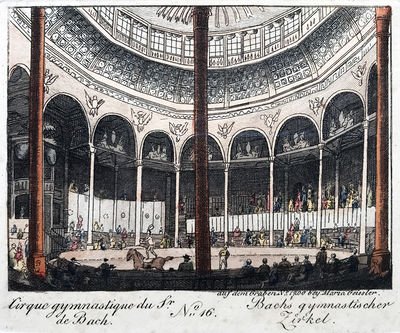Difference between revisions of "Main Page"
From Circopedia
| Line 28: | Line 28: | ||
==New Essays and Biographies== | ==New Essays and Biographies== | ||
| + | * [[Ethel Jennier]], Aerialist, Animal Trainer | ||
* [[Walter Jennier]], Sea Lion Trainer | * [[Walter Jennier]], Sea Lion Trainer | ||
* [[Rex Williams]], Elephant Trainer | * [[Rex Williams]], Elephant Trainer | ||
* [[Little Billy Merchant]], Clown | * [[Little Billy Merchant]], Clown | ||
* [[Jacko Fossett]], Clown | * [[Jacko Fossett]], Clown | ||
| − | |||
==New Videos== | ==New Videos== | ||
Revision as of 19:36, 4 May 2023
|
In The Spotlight
VIENNA'S CIRCUS GYMNASTICUS
The Circus Gymnasticus (Gymnastischer Zirkel) was one of the earliest permanent circuses built in continental Europe. It had been designed by the fashionable Austrian architect Joseph Kornhäusel for the Latvian equestrian Christoph de Bach (1768-1834), who had settled in Austria around 1805. The Circus Gymnasticus’s elegant building was erected in 1808 on the Prater—the old Imperial hunting ground that had become Vienna’s favorite park, and a focal point for fairgrounds amusements.It was a large structure shaped as a sixteen-sided polygon, built of stone on a heavy wooden frame. Its roof was supported by two circular rows of fourteen columns, and topped by a cupola above the ring, with large glass windows around its drum which provided sunlight—since the performances had to be given in matinee only, so as not to compete with Vienna’s patented theaters. Its façade fronted an extension containing the foyer, with stairs leading to the Imperial box and eighteen private boxes on the balcony facing the ring entrance. Another extension at the back of the building contained the stables, which expanded under the seating at each side of the ring entrance.
The circus was said to accommodate 3,000 spectators—most of them no doubt packed on the bleachers and in the promenoir running behind them on the balcony level. A platform for the orchestra was set over the ring entrance. This circular design was reminiscent of Astley’s old Royal Grove in London, and didn’t follow the more modern concept of amphitheaters designed with a ring and a stage, such as those used by Charles Hughes, the Franconis, and by Astley himself.... (more...)
New Essays and Biographies
- Ethel Jennier, Aerialist, Animal Trainer
- Walter Jennier, Sea Lion Trainer
- Rex Williams, Elephant Trainer
- Little Billy Merchant, Clown
- Jacko Fossett, Clown
New Videos
- Duo Gemini, aerial poleA Hanging pole (similar to a Chinese pole), used as an aerial apparatus. (2023)
- Jesús Coneiro & Estebalis Asperazu, hand-to-handAn acrobatic act in which one or more acrobats do hand-balancing in the hands of an under-stander. balancing (2022)
- La Tangente du Bras Tendu, flying actAny aerial act in which an acrobat is propelled in the air from one point to another. (2023)
- Egor & Lucia Sukhornukov, strap actAerial act performed hanging from a pair of fabric or leather straps. (See Aerial Straps.) (2022)
- Juliana Neves, tissu(French) A double piece of hanging fabric, generally made of silk, used for an aerial act. (See also: Fabric, Silks) (2001)
New Oral Histories
- For A Moment You Fly, The First Season of The Big Apple Circus (1977)
- Vladimir Durov Documentary on Russian Television (c.2000)
- Dolly Jacobs Interview at The Ringling (2018)
- Pinito del Oro's Interview on Spanish Television (1970)
- Gia Eradze's Interview on SSU TV (2015)
Circopedia Books
- Philip Astley & The Horsemen who invented the Circus, by Dominique Jando (2018)
A Message from the Founder
CIRCOPEDIA is a constantly evolving and expanding archive of the international circus. New videos, biographies, essays, and documents are added to the site on a weekly—and sometimes daily—basis. Keep visiting us: even if today you don't find what you're looking for, it may well be here tomorrow! And if you are a serious circus scholar and spot a factual or historical inaccuracy, do not hesitate to contact us: we will definitely consider your remarks and suggestions.
- Dominique Jando
- Founder and Curator
